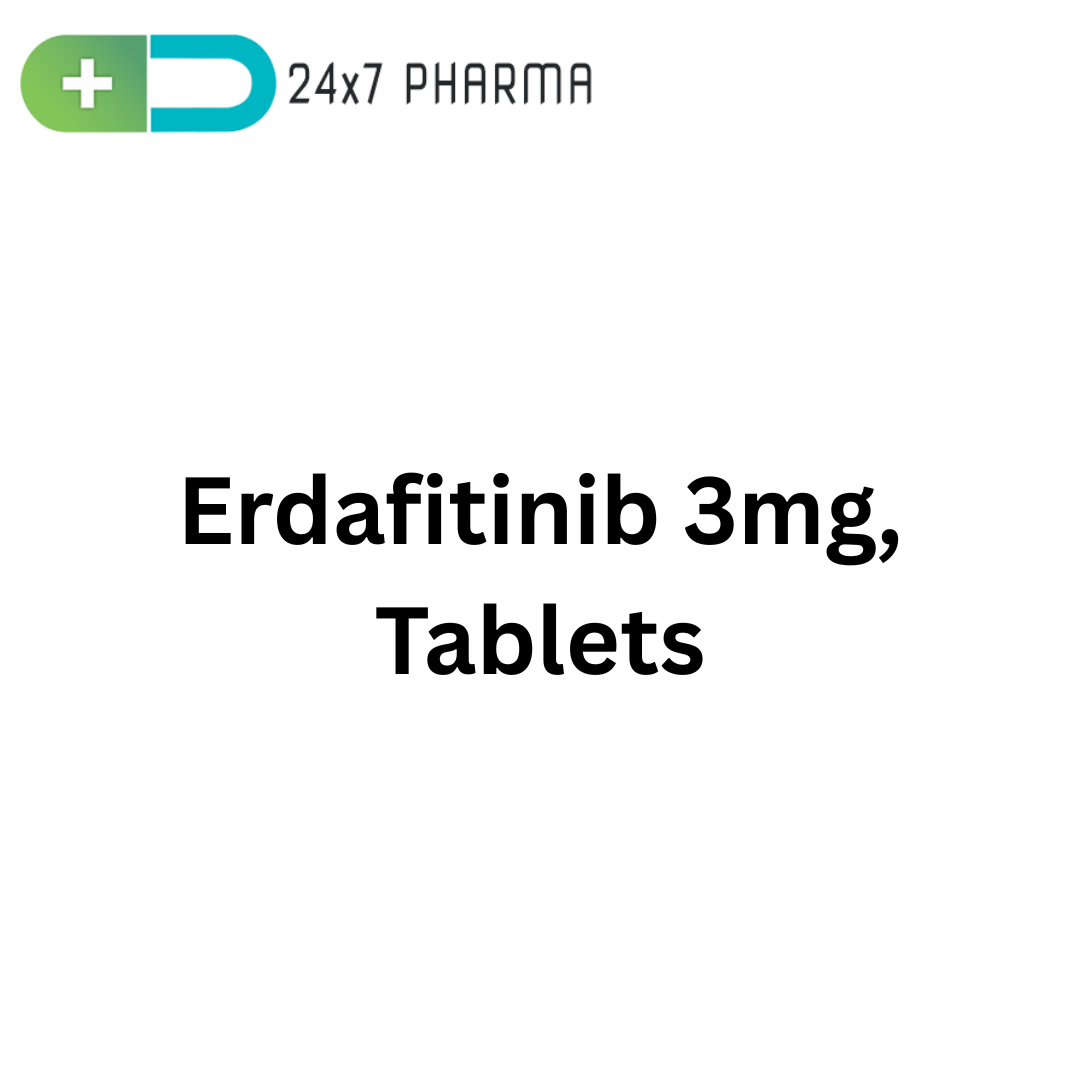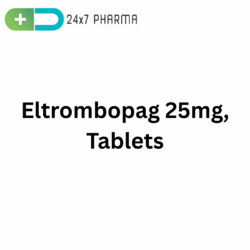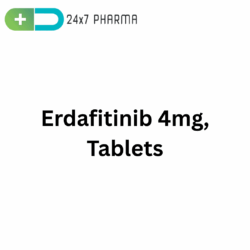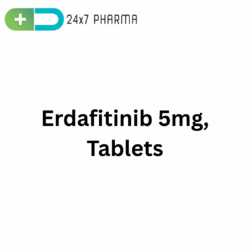LuciErda 3mg, Erdafitinib Tablets
LuciErda 3mg is a targeted cancer therapy medication containing Erdafitinib, a potent and selective fibroblast growth factor receptor (FGFR) inhibitor. Developed to treat specific types of advanced or metastatic bladder cancer, LuciErda belongs to a class of precision oncology medicines that work by targeting genetic alterations in cancer cells. It represents a major advancement in personalized cancer treatment, particularly for patients whose tumors harbor FGFR mutations.
What is LuciErda 3mg (Erdafitinib)?
Erdafitinib is a pan-fibroblast growth factor receptor (FGFR) tyrosine kinase inhibitor that is present in LuciErda. Adult patients with locally advanced or metastatic urothelial cancer that has progressed during or after platinum-containing chemotherapy and has genetic changes in vulnerable FGFR2 or FGFR3 are treated with it. Under a doctor’s supervision, LuciErda can be taken once daily as a 3 mg oral tablet.
How it Works / Mechanism of Action
Erdafitinib targets fibroblast growth factor receptors (FGFR1–4) and suppresses their activation. These receptors, when mutated or overexpressed, can cause uncontrolled cell division, leading to tumor growth and cancer progression. Erdafitinib selectively inhibits the kinase activity of these receptors, thereby preventing downstream signaling pathways such as MAPK and PI3K/AKT, which are essential for cell proliferation and survival. This inhibition slows or stops tumor growth, particularly in tumors dependent on FGFR signaling.
How to Use / Indications
LuciErda is indicated for adults with:
- Urothelial malignancy (bladder cancer), either locally progressed or metastatic
- Documented FGFR2 or FGFR3 genetic alterations
- progression of the disease following at least one platinum-based chemotherapy line, including within a year of receiving adjuvant or neoadjuvant therapy
- It is typically used as a monotherapy and requires prior genetic testing to confirm the presence of FGFR mutations or fusions.
How to Take / Dosage
- Starting Dose: The standard starting dose of LuciErda is 8 mg orally once daily.
- After 14–21 days, the dose may be increased to 9 mg once daily based on serum phosphate levels and tolerability.
- Tablets should be taken with or without food, swallowed whole with water.
- Patients should avoid eating grapefruit or drinking grapefruit juice, which may alter drug metabolism.
Other Dosage Considerations
- Dose Adjustments: Required in cases of side effects, reduced kidney or liver function, or drug interactions.
- Discontinuation: Stop the drug permanently if patients develop retinal disorders or severe adverse events unmanageable with dose reduction.
Side Effects
Common and serious side effects include:
Common:
- Hyperphosphatemia (high phosphate levels)
- Fatigue
- Dry mouth
- Stomatitis (mouth sores)
- Diarrhea
- Nail changes
- Hair loss
- Skin disorders (e.g., dry skin, redness)
- Eye problems (blurred vision, dry eyes)
Serious:
- Central serous retinopathy (CSR): A serious eye condition that can cause visual impairment
- Elevated phosphate levels requiring dietary or pharmacologic intervention
- Liver enzyme abnormalities
- Risk of embryo-fetal toxicity—not to be used during pregnancy
- Patients should undergo regular eye exams, liver function tests, and phosphate level monitoring during treatment.
Storage
- Store LuciErda tablets at room temperature (20–25°C).
- Protect from moisture and light.
- Keep in the original container and out of reach of children.
- Do not use if the seal is broken or after the expiry date.
Benefits
- Targeted Therapy: LuciErda provides a personalized approach, targeting FGFR mutations in cancer.
- Oral Administration: Unlike intravenous chemotherapy, it offers the convenience of home use.
- Improved Outcomes: In clinical trials, patients with FGFR alterations showed significant tumor shrinkage and delayed disease progression.
- Quality of Life: Many patients maintain better functional status compared to traditional chemotherapies.
Prescription
LuciErda 3mg (Erdafitinib) is a prescription-only medicine. It should be prescribed by an oncologist or healthcare provider trained in cancer genomics, with mandatory FGFR mutation testing before starting therapy.
Interaction
LuciErda may interact with:
- CYP2C9 and CYP3A4 inhibitors or inducers (e.g., fluconazole, rifampicin) – can affect drug levels.
- Drugs altering phosphate levels (e.g., phosphate binders).
- Acid-reducing agents like proton pump inhibitors – may reduce drug absorption.
- Grapefruit juice – can increase erdafitinib blood levels and should be avoided.
Patients must inform their doctor about all ongoing medications, including supplements and herbal products.
FAQs
How soon can improvement be seen with LuciErda?
Some patients may see benefits within 1–2 months, but response varies by individual.
Do I need regular tests while on LuciErda?
Yes, including eye exams, phosphate levels, and liver/kidney function tests.
Is LuciErda a chemotherapy?
No, it is a targeted therapy.
Can LuciErda be taken with food?
Yes, with or without food.
Is a genetic test needed before LuciErda?
Yes, to confirm FGFR2/3 alterations.
Conclusion
LuciErda 3mg (Erdafitinib) represents a breakthrough in targeted cancer therapy, especially for patients with advanced urothelial carcinoma harboring FGFR2 or FGFR3 mutations. By directly inhibiting FGFR signaling, it addresses the underlying driver of tumor growth in a subset of patients, offering improved clinical outcomes and quality of life. While side effects exist—especially related to phosphate levels and eye health—they are manageable with proper monitoring. LuciErda represents the growing trend toward precision medicine in oncology, where treatment is tailored to the molecular profile of the disease. Early FGFR testing and close monitoring can optimize its benefits and safety profile, making it a valuable option in the oncologist’s arsenal against advanced urothelial carcinoma.





